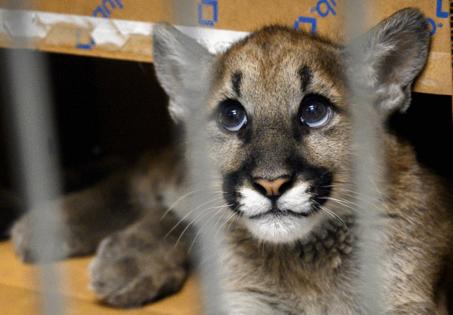Bird flu kills 20 big cats in Washington state sanctuary
Published in Cats & Dogs News
Four cougars. Four bobcats. Two lynx. Even a Bengal tiger.
Bird flu has taken a terrible toll at the Wild Felid Advocacy Center, a sanctuary for wildcats and their hybrids on Harstine Island, Washington, killing 20 cats — half the animals in its care.
"The only thing I can compare it to, as a veteran, is being in a war zone," director Mark Mathews said in an interview Tuesday. The sanctuary is usually open for tours, but because of the disease outbreak it is closed. The animals on-site are in quarantine, and no new animals are being accepted.
Just how the animals were infected is not yet clear, Mathews said. Was it droppings of wild birds flying overhead of the trees where the cats love to climb and roost? Was it in the meat in the freezer — all of it now destroyed just in case? Was it in the corn husks and other forage put out for the cats? On their toys? On a human caretaker's clothes? No one knows for sure.
This death toll is the latest in a slew of losses confirmed to be caused by the disease. Last week, two wild cougars on the north Olympic Peninsula were confirmed to be victims of bird flu, one of them dying a slow and terrible death, the other killed so quickly it showed no symptoms, according to Mark Elbroch of Panthera, director of the puma program for the global wild cat organization.
The virus, also known as Type A H5N1, has been circulating in Washington since at least 2022, when the state Department of Agriculture confirmed it in several backyard poultry flocks. Soon after, the Washington Department of Fish and Wildlife confirmed cases of the disease in wild birds.
Bird flu killed more than half a tern colony near Port Townsend this year, and 2023 saw the first jump of the disease from seabirds to harbor seals, the first report of marine mammals dying from the disease on the West Coast.
Mathews said he hopes the sanctuary can reopen by the new year. The nonprofit has been scrambling to empty and clean out the meat freezer and follow requirements of the quarantine intended to contain the viral infection, working with animal and public health officials at the federal, state and country level, Mathews said.
The center was founded by Shelleen and Mark Mathews in 2004. It takes in animals hurt in the wild, animals kept by private owners who no longer want them, animals left homeless when an owner dies, and more. Some have come from kennels so small they don't know what to do when released into the sanctuary's large habitat, Mathews said. The center cares for cats of many species, from five of the world's continents, providing large habitats for the animals including trees to climb — a favorite, Mathews said.
His favorite cat and best friend, Tabby the tiger, was killed by the disease, Mathews said. Four cougars died, one after another. "It's devastating. Heartbreaking. I don't know how else to say it, it's overwhelming huge anxiety, you think you are having a nightmare every day then we wake up and do it again."
The disease has been unpredictable. Some sick animals recovered, and some never became ill, Mathews said.
The first human cases of the virus were reported in the state in October, and as of early November, 14 confirmed and probable cases were reported, according to Washington State Department of Health data. Those cases were caused by contact with poultry. So far, there is no evidence of person-to-person transmission of bird flu in Washington.
The U.S. Centers for Disease Control and Prevention maintains the risk of the virus to humans is low.
To protect pets, don't let them scavenge carcasses of wild animals, said Staci Lehman, a communications manager for Fish and Wildlife. Don't handle dead animals yourself and then touch your pet. If you must pick up a carcass to dispose of it, use gloves. To limit exposure to possible virus-carrying animals, don't attract wild waterfowl to your property by feeding.
The disease is affecting thousands of wild birds and mammals, just in this country, according to the database kept by the U.S. Department of Agriculture since 2022. Mammals confirmed to be killed by the disease include the bottlenose dolphin, brown bear, polar bear, red fox, American marten, mink, fisher, on and on. Wild birds from green-winged teal to red-tailed hawk, eared grebe, snow geese, song sparrows — and so many more.
As the virus mutates and spreads, where the disease will kill next is hard to know, Lehman said. "It's fairly new and continues to evolve."
_____
(c)2024 The Seattle Times. Visit The Seattle Times at www.seattletimes.com. Distributed by Tribune Content Agency, LLC.









Comments